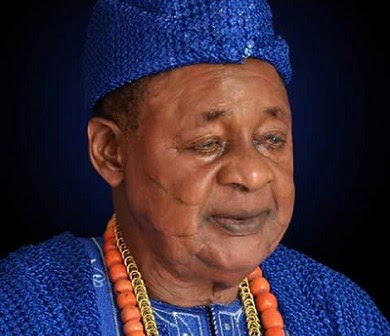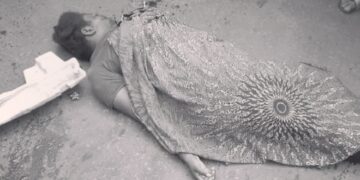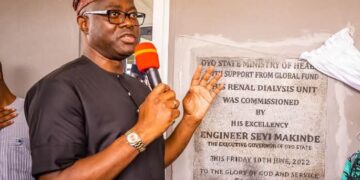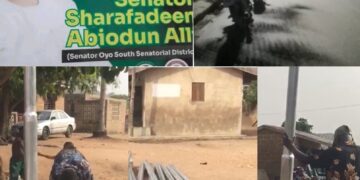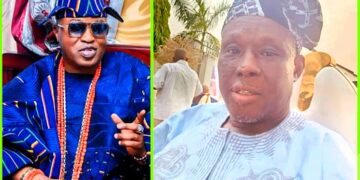Oba Adeniran Adeyemi II, was Alaafin of Oyo, between 1945 and 1954, until he was forced into exile by the Action Group led government of the Western region, as a result of the death of the Deputy leader of the Action Group, Chief Bode Thomas and also for having sympathy, for the rival NCNC of Dr. Nnamdi Azikiwe.
Chief Bode Thomas (1918-1953) became the deputy leader of the Action Group, he later formed Nigeria’s first indigenous law firm called- Thomas, Willams, Kayode and co. i.e. the trio of Bode Thomas, Chief Rotimi Williams and Chief Remilekun Fani Kayode.
Bode was a brilliant lawyer, but also very haughty and arrogant. He was made the Divisional Council Chairman in 1953, while the Alaafin of Oyo was a mere member.
On his first appearance in council, after being appointed chairman, all the council members stood up for him in deference, to welcome him except Oba Adeyemi II, who for cultural reasons, could not show deference to anyone in public.
Bode Thomas rudely shouted at the king, for having the temerity and audacity to disrespect him. “Why are you sitting when I walked in, you don’t know how to show
respect?” Bode Thomas rudely shouted at the Alaafin.
At that time, Bode Thomas was 35 years old and Oba Adeniran was in his 60’s.
The Alaafin felt very insulted and nonplussed. The monarch said “se emi lo n gbomo baun?” (Is it me you are barking at like that?). Oba Adeniran just told him “Ma gbo lo baun” (continue barking). Oba Adeniran Adeyemi II, was father of the incumbent Alaafin, Oba Lamidi Olayiwola Adeyemi III.
The confrontation happened on November 22nd 1953.
Bode Thomas got home and started barking!
He barked and barked like a dog all night until he died in the early morning of November 23rd 1953.He cut short his promising career.
Oba Adeniran Adeyemi II, was thereafter deposed and sent on exile in 1954 for sympathizing with opposition NCNC, because he had come in conflict with Bode Thomas who was Deputy Leader of the Action Group, before his untimely death.
In fact at a session in the parliament, Sardauna Ahmadu Bello had described Thomas as “Arrogant and ungracious”. Oba Adeniran Adeyemi II, was sent on exile to Ilesha and later relocated to Egerton Street on Lagos Island by the late Obafemi Awolowo’s administration, where he lived and died in 1960.
As at the time when Awolowo and his allies founded the Action Group (he was the national president of the party), while Alaafin Adeyemi II was the undisputed ruler of Oyo.
While Awolowo launched his relentless fights against the British imperialists, the Alaafin ruled in his own domain.
After Awolowo launched his Action Group party, other prominent individuals too went off and established theirs in other parts of Nigeria, a good example being the National Council of Nigeria and the
Cameroons (NCNC).
Before Awolowo started his political party, party politics in Nigeria was limited to Lagos and Calabar only.
Awolowo’s party performed very well in the West but because of very stiff opposition from the Northern People’s Congress (NPC) and NCNC, he was not able to build a coalition of voters large enough to make him win any federal election.
Alaafin happened to be a very big fan and supporter of the NCNC, the same party that Awolowo detested with everything. When the Egbe Omo Yoruba Parapo was formed by some of the most prominent sons of the land in 1953, it named the Alaafin of Oyo, Oba Adeyemi II as its patron and quickly formed an alliance with the NCNC.
When it was time for the local government elections of 1954, the Alaafin personally campaigned for the NCNC-Egbe Omo Oyo Parapo coalition.
The Alaafin and the Action Group members were cordial friends before they fell apart.
In fact, he was very jovial buddies with Action Group leaders like Bode Thomas (deputy leader of the Action Group) whom he bestowed with the title of Balogun in 1950 and Abiodun Akerele both of whom Oba
Adeyemi II supported in the 1951 regional elections in their successful bids for the house of assembly.
After the elections in 1952, Thomas become the chairman of the Oyo Divisional Native Authority (controlling Oyo town and its hinterland) while Akerele became the chairman of the Oyo Southern District Native Authority. The interesting thing to note here is that both councils were under the direct control of Oba Adeyemi when he became the Alaafin in 1945.
The British colonialists came and scattered the arrangement. It did not take long before the Alaafin and his old Action Group allies became sworn enemies.
With their men in power, the Action Group started reeling out new policies that directly undermined the powers of the Alaafin. A good illustration here will be the native court reforms of 1952 by the Bode Thomas-led Oyo Divisional Native Authority, the reforms deleted one of
the main sources of money and political influence of
the Alaafin by replacing the Iwefa chiefs (the traditional judges) with their own new appointees. That was not all, the very process of the 1950-51 elections meant that
the senior chiefs, baales (district heads) and other groups had to jostle for their own share in the new political space.
This eroded the political base and power of the Alaafin of Oyo who had been the all powerful paramount ruler.
The Action Group would make a vicious attempt to sound the death knell on the Alaafin’s position by introducing a government tax programme which included a ten shilling capitation tax and a four shilling education rate.There was also a new form of tax collection.For seven years, the collection and assessment of taxes were done by the Alaafin but with this new tax policy by the Action Group, that was not going to ever happen again.
A worthy example was in early 1953 when he alongside his Crown Prince (Aremo), actively went against the new tax policies and told the people not to cooperate.
In a meeting inside the Aafin (palace), the Alaafin was said to have passed a resolution against the government’s education and astronomical taxes.
A fearless fighter to the core, Oba Adeyemi also sought to neutralize the powers of the government’s native court reforms by establishing his own private courts right inside his palace and within the residences of his trusted chiefs. And his strategy worked.
Still an immensely popular figure, the people preferred the swift process of the Alaafin’s courts and before you could spell Alaafin, the state courts became practically useless because no one was going
there.
Litigants, especially those with marital disputes opted for the courts of their paramount ruler. A flabbergasted
Action Group decided to react and they launched their counterattacks. Bode Thomas accused the Crown Prince of aggravated assault, and the case was so serious that the Aremo was actually convicted later that year, but during an appeal, he was subsequently cleared.
What is more, the Oyo Divisional Native Authority reduced his annual salary by 650 pounds, removed the salary of the Crown Prince and other palace courtiers. They also ruled at an emergency meeting that the Alaafin was no longer the king and banished his son, the Aremo (Crown Prince) after accusing him of being a threat to the public order.
The battle line was drawn. Enraged stalwarts of the Action Group saw the Alaafin as a major threat to their ambitions, but Oba Adeyemi II did not seem to care.
By the time Awolowo started expressing his political views, it was
apparent that the two powerful figures were set on a catastrophic
collision course.
Awolowo was on the same page with the educated minority of Yorubaland
(Alaafin Adeyemi II had no Western education) and they held the belief
that the fundamental cause of virtually all the problems in the Yoruba
communities and their paramount rulers was incredibly vast power (via
the indirect rule method) given to these local chiefs, monarchs and
traditional rulers by the British colonial government.
Awolowo argued that this was not in line with the culture and
traditions of the people and suggested a reformed system of
administration and constitutional overhaul whereby those who will be
in control of political power for the Yorubas and all other
ethnicities in Nigeria will be the educated minority of that same
ethnic stock like him.
In other words, Awolowo was calling for the monarchs to be stripped of
their powers, while the same powers will be invested in him and his
Action Group.
The kings and the pro-monarchy figures did not like the proposal of
the ‘educated minority’.
He insisted that the local chiefs and kings (Obas) should not be
allowed to dominate the people saying the sole legitimate foundation
of government was that of the educated minority and that that was what
the people wanted.
Awolowo felt the Yoruba Obas were too powerful that their wings had to
be clipped, and Lloyd shared his view.
So that led to the introduction of the House of Chiefs by the Western
Regional Government under Awolowo.
It was a clear attempt to rein in the Yoruba kings and chiefs and
bring them under control of the regional government.
This however brought some new and peculiar problems for the Action Group.
Awolowo did not want the local chiefs to dominate and control the
party and at the same time he wanted the support of the masses that
were still very much loyal to the chiefs.
But there was no way he could reach out to the people without the
support of the chiefs.
So instead of going to the chiefs directly, what Awolowo did was to
bring the very institution of chieftaincy itself under the control of
the Action Group party.
That way, the party will deal with any errant Oba or chief via the
House of Chiefs that was created by the Action Group-dominated
regional government.
The House of Chiefs was a subordinate member of the Western Regional
Parliament established in 1952.
The way it was arranged, an Oba or chief could be punished, promoted,
offered or rejected membership for the House of Chiefs.
Oba Lamidi Adeyemi’s father, Adeniran Adeyemi II, who was the Alaafin
of Oyo for 10 years- 1945 to 1955, had seen in the young Lamidi
Olayiwola, a future Alaafin and had nurtured him along the paths of
royalty.
He had trained him as an Islamic cleric in Iseyin, and had lived
under the tutelage of Pa Olatoregun- an Anglican school teacher and
disciplinarian, in Oyo, all in an effort for young Lamidi, to learn
the rope of traditional kingship, statesmanship and dignifying
royalty.
Oba Lamidi Adeyemi III, in the quest of this preparation for Royalty,
was at an early age, sent to Abeokuta to live with Oba Adedapo Ademola
and had some part of his early education in Ake Palace Elementary
School and he is today still fluent in Egba dialect.
Oba Lamidi Olayiwola, at a later date in his adolescence, also lived
with a Lagos Aristocrat-his father’s friend-Sir Kofo Abayomi and his
wife, Lady Oyinkan Abayomi.
He also attended St Gregory’s College, Lagos- a Catholic School.
Perhaps, this early preparation for royalty, has no doubt made Oba
Lamidi Adeyemi III, a quintessential monarch, not only with wit, but
also with class, candour, panache and indeed, a deep sense of wisdom.
Amongst Oba Adeniran’s children, Lamidi Adeyemi was his favourite.
He had seen at birth, the lacerations on his left breast and the spots
on his leg, at the same spot on Lamidi Olayiwola, as tell tale signs
of future royalty.
Oba Adeniran’s death truncated the ambition of Lamidi Olayiwola
Adeyemi, to proceed to the United Kingdom to study law.
He later became an Insurance Executive with the Royal Exchange
Assurance, where he worked until he ascended the throne of his
forefathers, as the Alaafin of Oyo in 1971.


